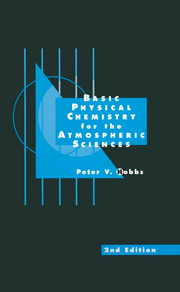Book contents
- Frontmatter
- Contents
- Preface to first edition
- Preface to second edition
- 1 Chemical equilibrium
- 2 Chemical thermodynamics
- 3 Chemical kinetics
- 4 Solution chemistry and aqueous equilibria
- 5 Acids and bases
- 6 Oxidation–reduction reactions
- 7 Photochemistry
- Appendix I International system of units (SI)
- Appendix II Some useful numerical values
- Appendix III Atomic weights
- Appendix IV Equilibrium (or dissociation) constants for some chemical reactions
- Appendix V Some molar standard Gibbs free energies of formation, molar standard enthalpies (or heats) of formation, and molar absolute entropies at 25°C and 1 atmosphere
- Appendix VI Names, formulas, and charges of some common ions
- Appendix VII Answers to exercises and hints and solutions to selected exercises
- Index
2 - Chemical thermodynamics
Published online by Cambridge University Press: 05 June 2012
- Frontmatter
- Contents
- Preface to first edition
- Preface to second edition
- 1 Chemical equilibrium
- 2 Chemical thermodynamics
- 3 Chemical kinetics
- 4 Solution chemistry and aqueous equilibria
- 5 Acids and bases
- 6 Oxidation–reduction reactions
- 7 Photochemistry
- Appendix I International system of units (SI)
- Appendix II Some useful numerical values
- Appendix III Atomic weights
- Appendix IV Equilibrium (or dissociation) constants for some chemical reactions
- Appendix V Some molar standard Gibbs free energies of formation, molar standard enthalpies (or heats) of formation, and molar absolute entropies at 25°C and 1 atmosphere
- Appendix VI Names, formulas, and charges of some common ions
- Appendix VII Answers to exercises and hints and solutions to selected exercises
- Index
Summary
Heat can be released or absorbed during a chemical reaction. This provides a powerful method for studying chemical equilibrium by means of chemical thermodynamics. Thermodynamics is based on a few fundamental postulates, called the first, second, and third laws of thermodynamics. We will discuss these laws first, and then apply them to chemical equilibria.
The first law of thermodynamics; enthalpy
In addition to the macroscopic kinetic and potential energy that a body or system as a whole may possess, it also contains internal energy due to the kinetic and potential energy of its molecules or atoms. Increases in internal kinetic energy in the form of molecular motions are manifested as increases in the temperature of the system, while changes in the potential energy of the molecules are caused by changes in their relative configurations.
Let us suppose that a system of unit mass takes in a certain quantity of heat energy q (measured in joules). As a result, the system may do a certain amount of external work w (also measured in joules). The excess energy supplied to the system, over and above the external work done by the system, is q – w. Therefore, if there is no change in the macroscopic kinetic and potential energy of the system, it follows from the principle of conservation of energy that the internal energy of the system must increase by q – w.
- Type
- Chapter
- Information
- Basic Physical Chemistry for the Atmospheric Sciences , pp. 17 - 42Publisher: Cambridge University PressPrint publication year: 2000



